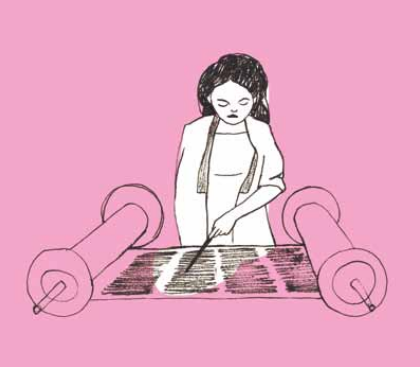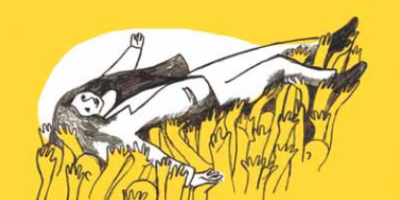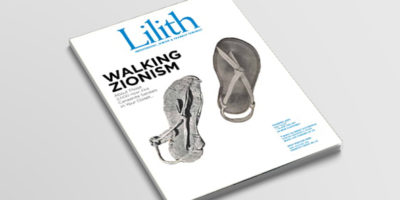
down the crooked path to a daughter’s bat mitzvah
Divorce cleaves a girl’s interfaith family in two. What happens when
the author vows to raise religiously unconfused children.

by Hila Peleg
My daughter’s body is enveloped by the tallis — woven silk threads of pale pink and white and green that we had commissioned for her to wear on this day. Underneath, she wears a cropped cardigan over a wisp of a dress — peach-dotted fabric that drops to her knees over a crinoline skirt.
“It’s perfect, Mom!” she said days earlier as she spun around in the store’s dressing room, just enough air caught underneath to lift the crinoline in a billow — this being at least the hundredth dress she had tried.
Her straight brown hair frames her face, capped by a handmade white kippah macraméd with lace and sequins. A miniature Elsa Peretti Star of David — which I gave her the day before — hangs from a thin chain and sits in the hollow of her throat.
I am seated in the front row, facing the bimah, which is infused by warm hues from the sanctuary’s stained glass. My father, who gave me Judaism, sits to my right. I watch as my daughter reads the hand-inked Hebrew words from the Torah, her pitch rising and falling as dictated by ancient trope, her pronunciation deliberate. She is a master at this. As the silver-pointed finger of the yad glides over the parchment, she becomes a full-fledged member of those who can read. She is one of them.
My parents married as teenagers; my father from a non-practicing Jewish family on Long Island, my mother from a Protestant family in Texas. They found each other in college and decided to raise their children Jewish; my father’s wish and my mother’s choice. I was named Mary for my mother’s deceased mother but have always been called Marty at my father’s insistence, lest there be confusion about my faith.
I started my Jewish education as a kindergartener in a suburb of Boston, and my parents created a Jewish home for my two younger brothers and me. We lit menorah candles and never decorated a Christmas tree. We searched under sofa cushions for the afikomen and never hunted for Easter eggs or were given baskets filled with plastic grass and chocolate bunnies.
Just before I turned eight, my family moved to Columbia, South Carolina, where my father served as an Army physician. The Jewish community was much smaller there, and school children were eager to point out differences. When assigned to make Easter baskets from Popsicle sticks, I instead glued together a “Passover basket” topped with a Star of David.
“P.U.! A Jew!” one boy said, holding his nose and pointing.
When my father returned home from work that evening, I shared with him what had happened as he changed his clothes from a long day.
“That’s right — I’m a Jew! And I’m proud of it, too!” he instructed me to respond if it were ever to happen again, his voice rising in anger. Judaism was no longer just my religion, but a part of me at risk for attack.
I remember feeling, at that moment, my connection to Judaism deepen.
i have few childhood memories of my afternoons at Hebrew school. I remember the classroom, the blackboard, the hard, uncomfortable chairs, and the hunger, as often I hadn’t eaten a sufficient after-school snack. I went long enough to learn the Hebrew alphabet and count to 10. But just as I was beginning to learn the V’ahavta for my bat mitzvah, my parents divorced and my father moved back to the Northeast.
The commitments they had made to each other as part of their marriage dissolved, and although my father traveled to Israel, became a bar mitzvah at the Kotel as an adult and sent me postcards from Eilat exalting our Judaism, his ability to influence my upbringing became limited. My parents decided together to discontinue our family’s synagogue membership, and my bat mitzvah preparation came to an end.
But I had memorized and could recite the V’ahavta — I could speak the Hebrew words that contained the commandments to “love God with all of my heart, soul, and might.” V’shinan’tam l’vanekha v’dibar’ta bam — the translation simple at the time, not yet swollen with meaning: my commitment to teach the commandments of God diligently to my children and to speak of them throughout my days.
Because my mother felt strongly that her children should have religion, regardless of which, she — and my new Southern, Protestant stepfather — started taking us every Sunday to a Methodist church. I daydreamed through the services but soon could recite the Lord’s Prayer and certain hymns by heart. Too self-conscious to sit in silence and draw attention to myself, I read and sang aloud with everyone, but never uttered the words “Jesus Christ.” I would also take our seder plate to my Sunday school class every Passover and explain that I was half-Jewish.
“Which half?” my classmates asked.
“This one,” I said, drawing a vertical line in the air down the middle of my body and then holding up my right hand.
During the years that followed, holding onto my Jewish identity remained my steadfast desire, despite my participation in Christian youth groups (with my friends) and my complete lack of Jewish education. More than a religion, Judaism had become my quiet connection to my father, who maintained a synagogue membership in his new hometown despite celebrating Christmas with his new Catholic wife. How funny to think of myself as that rare child who wished that Christmas (in both her parents’ houses) would disappear! The absence of a decorated tree, no chain of lights or glistening tinsel — this would mean that I was Jewish. That I was home.
As an adult, I started to educate myself, taking Intro to Judaism in college, making Jewish friends, dating Jewish men, and sitting at their families’ seder tables. I attended medical school at the Albert Einstein College of Medicine of Yeshiva University in the Bronx, surrounded myself with Orthodox Jewish students and teachers, and learned as much about the practice of Judaism as the anatomy of the human being.
There I met my husband, Eric, the son of two Jewish parents, and I took part in a Conservative conversion to satisfy the rabbi who would marry us. He arranged for us to arrive one weekday morning at an address on the Upper West Side, and we were greeted by four rabbis seated in a semicircle, each with a white beard and black suit.
“We understand that you were, in fact, raised Jewish for much of your childhood and that you consider yourself to be Jewish already, is that right?” the rabbi to my right asked.
I nodded, unnerved.
“So we won’t quiz you as we would a person who was not raised in a Jewish home, okay? Instead, you’ll dunk in the mikvah, and we’ll consider your conversion complete.”
I was directed into another room, a dressing room, where I was instructed to remove my clothes, put on a thick terrycloth bathrobe, and then enter another room where a woman would be waiting for me. This room contained a miniature tiled, heated pool. A small woman who wore a head covering, and seemed to speak little English, gestured for me to remove the robe and descend the stairs into the pool, completely submerging my naked body. When I raised my head to breathe, she waved me over to the side and placed her hands on my head, reciting a prayer in Hebrew. She brought the robe to the top of the stairs, and I put it on, got dressed, and rejoined the rabbis and Eric.
“Mazel tov, Miriam!” the rabbis cheered in unison, handing me my conversion certificate printed with my official Hebrew name. They each shook my hand. My hair still wet, we left the building and traveled home, happy to have this technicality addressed and the ambiguity behind us.
I was Jewish. Again.
“L’chaim!”
We were married under a chuppah, complete with the shattering of glass under Eric’s foot. From my son’s bris and my daughter’s baby-naming, to Jewish preschools, playgroups and camps, our children have never questioned their family’s religion. Once my four-year-old daughter was in a toy store, sifting through a pile of velvet cardboards, each with its own design. As she picked up each one, she recited its name:
“Hooorse, rainbowwww, unicooooorn, Godddd…”
I stopped her. Who was she calling God?
“May I see the picture?” I asked,
and she pulled out one with the face of Santa Claus.
“Isn’t that Santa Claus?” I asked.
“No,” she said, smiling. “It’s God.”
I was immediately brought back to the years when I wished that Christmas in my own childhood home would disappear. And now, to my amazement, my four-year-old daughter didn’t even know who Santa Claus was, much less wish that he would visit our house.
Yet she had an image in her mind of the face of God — full beard, kind eyes, and a warm smile. For me, it was a moment of satisfaction.
My daughter is facing the rabbi in front of the ark, six scrolls of Torah watching over them, their metal crowns and plates glistening from the ner tamid. The rabbi is offering her private words, meant only for her, and the cantorial soloist is singing from Debbie Friedman’s Lechi Lach, a reference to my daughter’s Torah portion:
L’chi lach, to a land that I will show you
Leich l’cha, to a place you do not know
L’chi lach, on your journey I will bless you
And you shall be a blessing, l’chi lach.
The rabbi places his hands flatly on my daughter’s head, blessing her. We are standing, my father’s arms wrapped around my shoulders as tears flow down my cheeks. It was a long-interrupted journey, one that somehow wound around and came back to find the two of us together at this moment, side by side.
How likely was it that I would follow through with the V’ahavta that I had learned all those years ago? V’shinan’tam l’vanekha: a commitment to teach the commandments of God diligently to my children and speak of them throughout my days.
I have searched for lingering feelings of envy, fueled by the resentment I experienced reciting the Lord’s Prayer on those Sundays at church while my Jewish friends continued their religious educations. Why aren’t I jealous of my daughter for taking that place on the bimah, a place I had fervently wanted to take when I was 13?
Instead, rather than envy I feel a great deal of success as a Jewish parent. I set out to raise children without religious confusion, and I have done so. Ultimately, I have come to believe that this was my charge. My daughter has joined the ranks of those who can read. Although I can’t, she can. She is one of them.
Marty Ross-Dolen is a child and adolescent psychiatrist currently staying home, in Bexley, Ohio, to raise her two children. She writes creative nonfiction and volunteers in her community.



